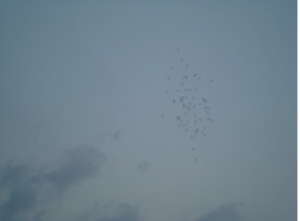
PRESIDENT OF CONVENTION ON CLUSTER MUNITIONS, SRI LANKA, MUST COME CLEAN ON PAST USE
“Fudging your own past use is simply not an option as President of the body championing the campaign to eliminate this banned weapon,” said the Executive Director of the International Truth and Justice Project, Yasmin Sooka, who first investigated the allegations in 2011 for the UN Secretary General’s Panel of Experts on Sri Lanka. “Tamils who worked for the United Nations and de-mining groups tell us on several occasions they personally witnessed cluster munitions falling and examined the casings immediately afterwards. Doctors in the war zone operated to remove a cluster munition embeded in a woman’s leg. After the war, deminers described finding cluster remains in several locations, only to have the army cordone off the area and keep the findings secret from the local community,” she added.
Under the Convention, Sri Lanka is required to show transparency and report annually in a public document on use, stockpiling, clearance and destruction. These obligations include issuing an immediate and effective warning to civilians living in cluster munition contaminated areas (Article 7j); instead the Sri Lankan Army has to date tried to hide discoveries of cluster munitions and has not informed or consulted local communities as required by the Convention (Article 5f). Indeed on becoming President of the Convention on Cluster Munitions this month, Sri Lanka’s Permanent Representative to the United Nations in Geneva, Ambassador A.L.A Azeez, again flatly denied the country had ever used cluster munitions without explaining how the remnants keep being discovered .
“This continual denial is an ever increasing affront to the victims who witnessed the death and injury of loved ones - or were themselves injured by cluster munitions,” said Ms. Sooka. “The Government of Sri Lanka has never explained how cluster munitions were dropped from the air onto civilians if it wasn’t from their jets”.
Under the Convention on Cluster Munitions Sri Lanka has an obligation to persuade other states to join, which is difficult to do if the President lacks transparency over both its own alleged past use and its clearance operations post-war.
The Convention also requires Sri Lanka to assist victim communities and not to discriminate against or among victims (Article 5e). At the same time, identifying themselves in the current climate could put Tamil victims at risk from the security forces. Those who are former combatants and not yet detained would fear coming forward because they would risk detention in the government’s “rehabilitation programme”, which was recently declared “wrongful detention” by the UN Working Group on Arbitrary Detention .
“In Sri Lanka’s case they have driven many de-miners and UN staff out of the country and effectively silenced the witnesses. There are also many victims among recent refugees outside Sri Lanka in countries like Switzerland; their geographic dislocation should not diminish their rights as victims,” said Ms. Sooka. “The Convention requires Sri Lanka to undertake a victim survey which should include victims abroad subject to internationally recognised witness protection provisions.”
The ITJP has compiled a briefing note summarising some of the evidence on cluster munition use in 2009 in Northern Sri Lanka. It acknowledges the extensive work of other groups and journalists on this issue but adds 24 excerpts of testimony from its unique archive of more than 300 witness statements held outside the country. Also included are some of the contemporaneous text messages sent out by UN staff that referred to the use of cluster munitions. However we are also aware of many more eyewitnesses now abroad whose testimony has not been recorded.
See http://www.itjpsl.com/assets/press/28-sept-2018-cluster-munition-press-release-ITJP-final.pdf for the full briefing note.
Yasmin Sooka
The International Truth & Justice Project
+ 27 (0) 11-484-0390
email us here
Visit us on social media:
Twitter
EIN Presswire does not exercise editorial control over third-party content provided, uploaded, published, or distributed by users of EIN Presswire. We are a distributor, not a publisher, of 3rd party content. Such content may contain the views, opinions, statements, offers, and other material of the respective users, suppliers, participants, or authors.


